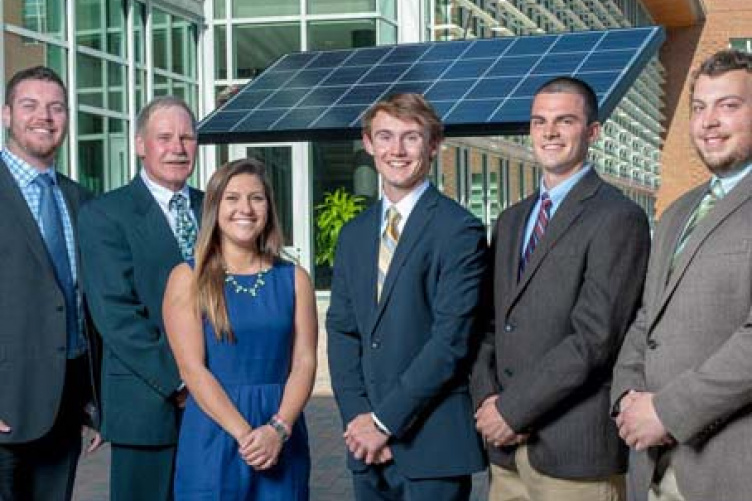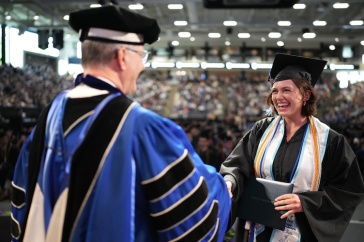
The Granite State Ventures team (L-R: Daniel Crowley, Professor Jeffrey Sohl, Bridget Fay, Cole Jaillet, Andrew Nelligan, Jeffrey Moore) and their award-winning TiltOne power point tracking system for solar panels.
Engineering ingenuity and entrepreneurial smarts proved a winning combination for a team of UNH seniors whose project took a top prize at a recent national environmental design competition. The team – three business entrepreneurship majors from the Paul College of Business and Economics and two mechanical engineering majors from the College of Engineering and Physical Sciences, led by Paul College professor Jeff Sohl – won the INTEL Innovation award for the top project in the 24th annual Environmental Design Contest at New Mexico State University earlier this month.
“We were the only team there with business as well as engineering majors,” said Cole Jaillet, an entrepreneurship and marketing major, explaining their winning edge. “The engineers created this cool product, but it was up to us business majors to make it feasible.” Calling themselves Granite State Ventures, the UNH team was one of 19 competing.
The contest, hosted by the Waste Management Education and Research Consortium (WERC), challenges undergraduates from around the U.S. to develop technological solutions to one of five real-world environmental challenges. The UNH team chose to tackle an economic obstacle to solar panels: The energy “cost” of the system that moves them to track the sun during the day.
“We created a system that’s really going to take care of a real problem,” said entrepreneurship and marketing major Daniel Crowley. |
Called power point tracking systems, these systems draw energy generated by the solar panels to power the motor, making them inefficient. Further, solar panels lose energy during the day due to overheating. The engineers on the team, Jeffrey Moore and Andrew Nelligan, addressed both inefficiencies by utilizing thermoelectric generators to harness that excess heat for the energy that swivels the panels to follow the sun at an optimal angle as it passes through the sky.
“We created a system that’s really going to take care of a real problem,” said entrepreneurship and marketing major Daniel Crowley. Their system, which they call TiltOne, harnesses 22 percent more energy than traditional systems, they said.
While the engineers solved the technical problem and created a prototype of their design, the entrepreneurs – Jaillet, Crowley, and marketing and entrepreneurship major Bridget Fay – applied their business acumen to make TiltOne a success in the marketplace.
Scanning the landscape of their potential market – commercial facilities that might use rooftop solar panels – Granite State Ventures learned that less than one percent of the nation’s five million commercial buildings use solar panels, despite the fact that “the vast majority of commercial buildings are friendly to solar power,” said Moore.
The students’ marketing plan addressed pricing, regulatory issues and incentives, payback period, and competition. With approximately 4.9 million buildings in their market share and a solar market that’s expected to grow revenues by 8 percent in 2014 alone, TiltOne seemed poised for success.
The judges – experts from industry and government – agreed. “This award proves that the project works,” said Jaillet.
Integrating significant business expertise into an environmental engineering challenge distinguished Granite State Ventures to the judges, the students say. It also gave them real-world experience they might have missed had they not worked across disciplines.
“It reflects well on you. It’s what you deal with out in the workplace,” said Crowley.
“It’s a great talking point during interviews,” Fay added. The students credit UNH and their faculty mentors, mechanical engineering professors Barbaros Celikkol and Brad Kinsey in addition to Sohl, for encouraging this interdisciplinary effort. “The only barriers were scheduling and the distance between the Paul College and Kingsbury,” Fay said.
“I believe this is a tribute to our ability at UNH to successfully work across disciplines. I look forward to continuing to offer unique interdisciplinary activities such as this to our students in the future,” said Sohl, who is the director of UNH’s Center for Venture Research.
“Jeff Sohl’s the man,” Fay added, noting that he treated the students like real entrepreneurs, encouraging them to act independently and make their own decisions. The students also credit Center for Venture Research program coordinator Laura Hill, who managed the many details of their project and their trip to New Mexico.
Having impressed environmental engineers at the WERC competition, TiltOne seeks to prove its business mettle at the upcoming Holloway Prize Innovation-to-Market Competition. It’s one of 15 start-ups competing in the semi-final round, the Bud Albin Challenge, tomorrow (April 25, 2014), and their sights are set squarely on the Championship Round May 7.
Originally published by:
UNH Today
-
Written By:
Staff writer | Communications and Public Affairs
















































